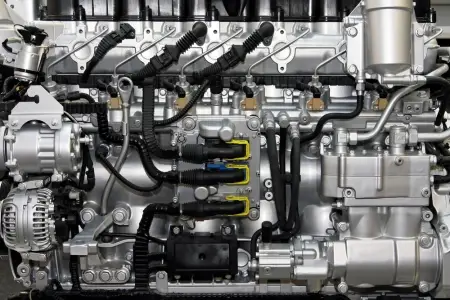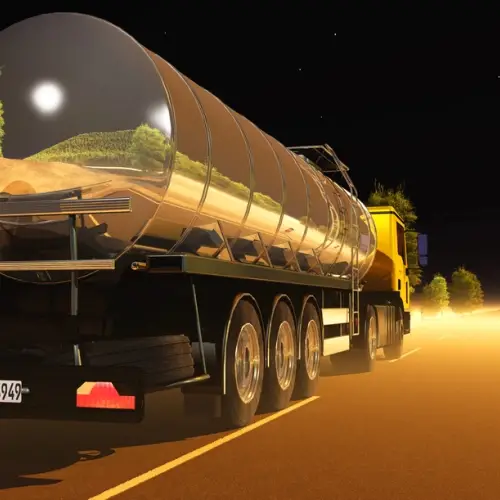
Diesel engines are a type of internal combustion engine that are characterized by their efficiency and robustness.
Unlike spark-ignition engines such as gasoline engines, diesel engines operate by compressing air inside the cylinder, generating temperatures high enough for the fuel to ignite spontaneously.
This fundamental characteristic influences several of their properties and makes them very popular in industrial applications, heavy vehicles and agricultural machinery.
1. Operating principle of diesel engines
The main characteristic of the diesel engine is that it is based on the principle of compression, which means that the air inside the cylinder is compressed to a much higher compression ratio than in gasoline engines.
This compression increases the temperature of the air, which can reach over 500 °C. At this point, the fuel is injected, usually diesel, which ignites spontaneously due to the high temperature of the compressed air, without the need for a spark plug.
This combustion process generates a large amount of energy that pushes the piston down, producing mechanical work.
The operating cycle of a diesel engine follows the four phases of the Otto cycle, but with some key differences:
- Intake: Air is introduced into the cylinder without a fuel mixture.
- Compression: Air is compressed to high pressure, which increases its temperature.
- Combustion: Fuel is injected and ignites spontaneously due to the temperature of the compressed air.
- Exhaust: The gases resulting from combustion are expelled from the cylinder.
The high compression ratio and the absence of an external spark are what differentiates the diesel engine from the gasoline engine.
2. Compression ratio and thermal efficiency
One of the most notable features of diesel engines is their high compression ratio, which typically ranges from 14:1 to 25:1, compared to gasoline engines, which typically have a compression ratio of 8:1 to 12:1.
This high compression ratio is possible due to the characteristics of diesel fuel and the robustness of the diesel engine design, which is prepared to withstand the high pressures generated during compression.
High compression ratio results in higher thermal efficiency. The higher the compression ratio, the higher the temperature and pressure generated during the compression process, which increases the amount of energy released during combustion.
This superior thermal efficiency is one of the reasons why diesel engines consume less fuel than gasoline engines to generate the same amount of power.
In addition, diesel has a higher calorific value than gasoline, which means it provides more energy per liter of fuel. This translates into greater engine performance and greater vehicle autonomy.
3. Torque and low-rev performance
Diesel engines have a special feature: they generate high torque at low revs.
 This is due to the higher energy density of diesel and the way combustion occurs in these engines. Due to the high compression ratio, the pressure inside the cylinder is much higher than in gasoline engines, which generates a large amount of energy even at low revs.
This is due to the higher energy density of diesel and the way combustion occurs in these engines. Due to the high compression ratio, the pressure inside the cylinder is much higher than in gasoline engines, which generates a large amount of energy even at low revs.
This high torque at low revs is one of the reasons why diesel engines are particularly suitable for applications requiring high load capacity, such as heavy vehicles, agricultural machinery or boats.
Trucks and buses, for example, can use diesel engines because of their ability to generate sufficient torque at low engine speeds, allowing them to carry large loads without requiring high engine revs.
4. Fuel efficiency
One of the biggest advantages of diesel engines is their fuel efficiency.
Due to the high compression ratio, diesel engines make better use of the energy contained in the fuel. This results in lower fuel consumption for an equivalent amount of work compared to gasoline engines.
Diesel has a higher energy density than gasoline, meaning that less fuel is needed to generate the same amount of energy.
This contributes to increased range of diesel vehicles and lower operating costs in industrial and transportation applications, especially long-range vehicles such as trucks and trains.
5. Durability and reliability
One of the best-known features of diesel engines is their durability and reliability .
The robustness of its design is intended to withstand the high pressures generated during compression. Components such as the engine block, crankshaft, connecting rods and pistons are made of stronger and thicker materials than those of gasoline engines, allowing the diesel engine to have a longer service life.
In addition, diesel engines have a lower engine rotation speed compared to gasoline engines. This means that diesel engines typically suffer less wear and tear and can achieve a higher mileage before needing significant repair.
6. Emissions and emission control technology
Although diesel engines are more fuel efficient, they are also known for their emissions of nitrogen oxides (NOx) and fine particulate matter, which are harmful to human health and the environment.
 However, in recent years, technological advances have made it possible to reduce these emissions through the implementation of emission control systems.
However, in recent years, technological advances have made it possible to reduce these emissions through the implementation of emission control systems.
Technologies used to reduce diesel engine emissions include:
- Diesel particulate filters (DPF): These devices capture solid particles generated during combustion and burn them in a regeneration process.
- Selective Catalytic Reduction (SCR): This system uses a catalyst to reduce NOx emissions by injecting a reducing agent, such as urea, which converts NOx into nitrogen and water.
- Exhaust Gas Recirculation (EGR): This system recirculates a portion of the exhaust gases back into the engine to reduce combustion temperatures and therefore NOx emissions.
These advances have allowed diesel engines to comply with strict emissions regulations, such as the Euro regulations in Europe, which have progressively increased the emission limits for pollutants.